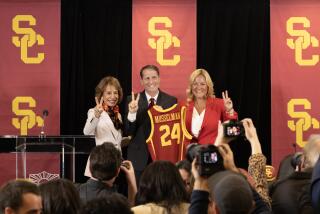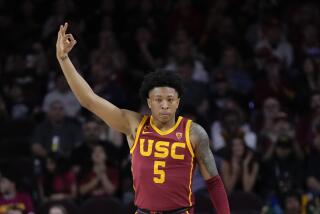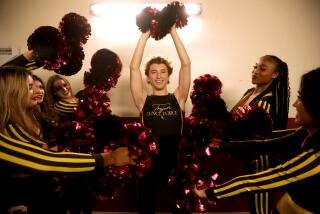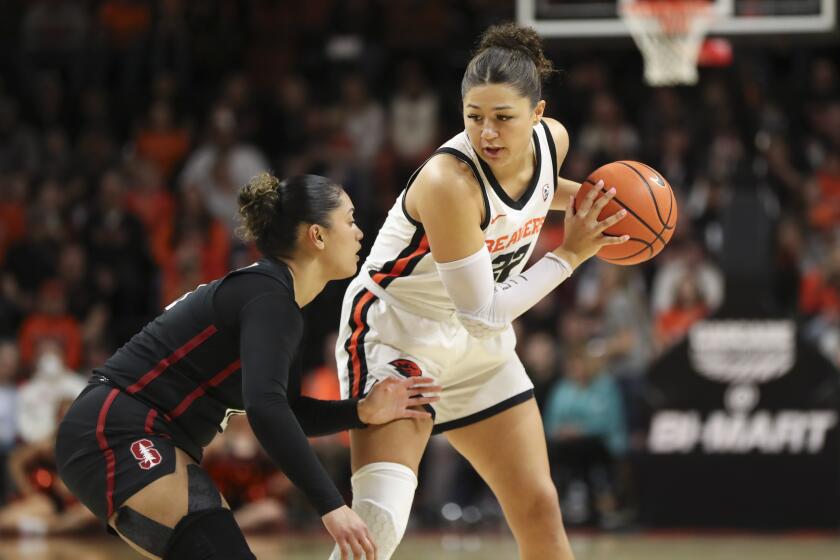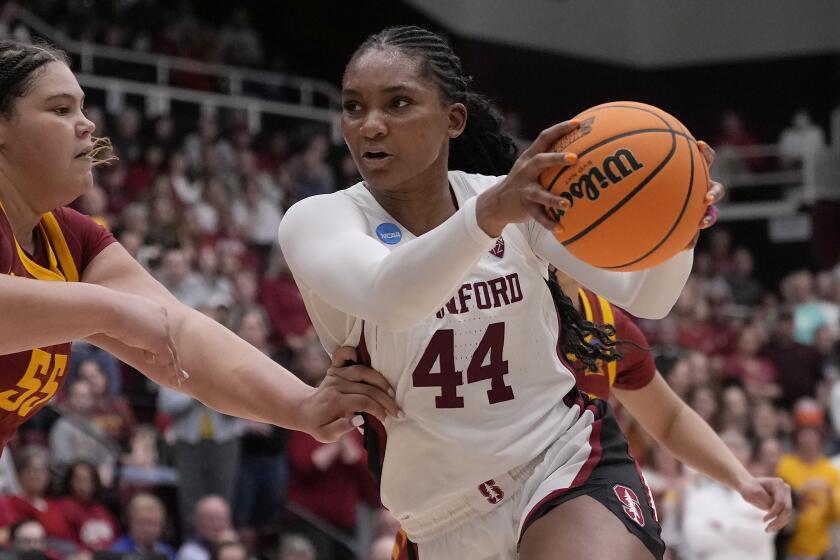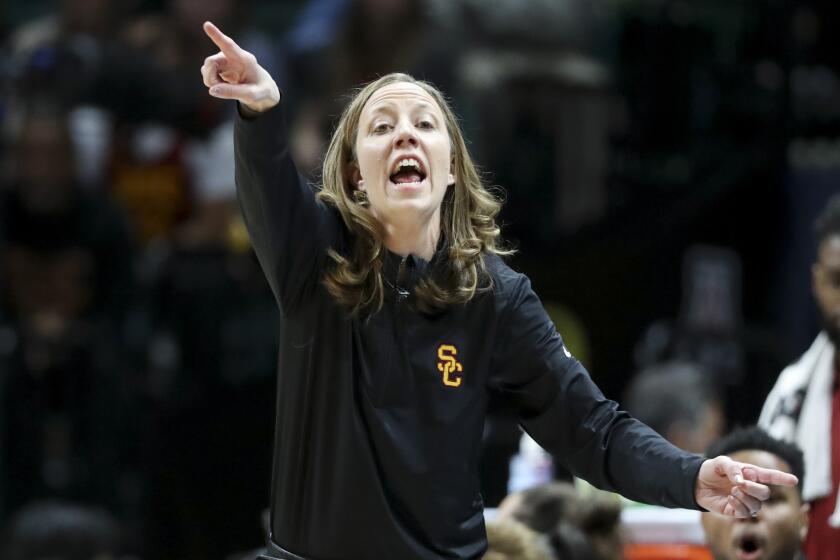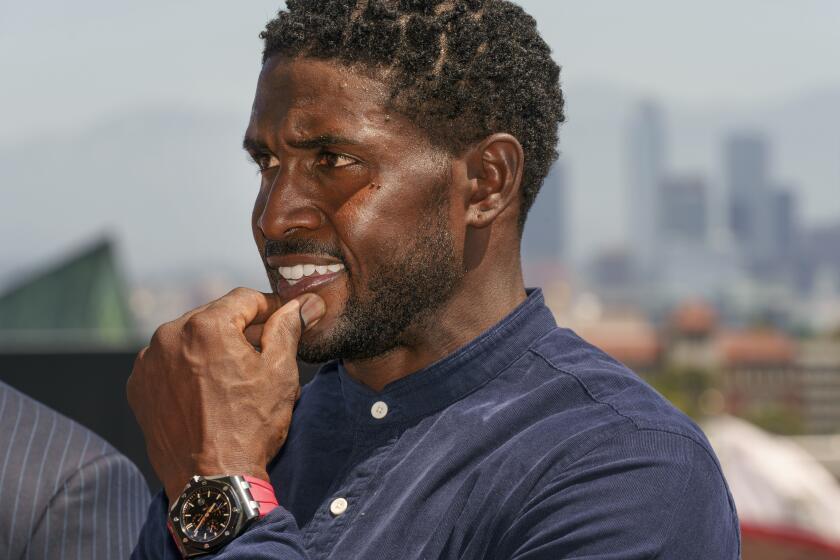Crowe’s Nest: Even at 90, life for former USC coach Peter Daland is going swimmingly
It started with a stopwatch.
Peter Daland, USC’s championship-winning former swim coach, was only 8 years old when his parents gave him the timepiece as a gift, but immediately he grasped the possibilities.
“I went up to the pool,” he says, “and I told the other kids, ‘Let’s have a workout.’ I didn’t even know what a workout was.”
That day, Daland later realized, a coach was born.
In time, Daland would make his mark not at that tiny community pool in Philadelphia but at USC, where from 1958 to 1992 his star-studded teams won nine NCAA championships and produced scores of All-Americans and Olympic medalists.
This weekend, in conjunction with USC’s annual “Swim With Mike” fundraising event, he’ll be joined by more than 300 invited guests as he returns to campus to celebrate his 90th birthday.
They’ll discover that, as a nonagenarian, he’s no less passionate about swimming than he was as a grade-schooler.
During an interview at his Moorpark home, Daland is still buzzing from a recent trip to Minneapolis, where he attended the NCAA swimming championships as USC’s guest.
A father of five and grandfather of eight, he still travels to Europe annually to scout the opposition for USA Swimming.
He is excited about his most pressing project — writing a six-volume history of Olympic swimming — but laments that he has fallen behind. He’s only midway through the second volume.
“It’s a huge project,” he says, “and I’m rather inept with a computer. I didn’t do anything on a computer until I was 73 years old and that’s a little too old to start. . . .
“I’m eventually going to have to hire somebody because when I hit the wrong button and I lose a month of work, it’s depressing.”
Not depressing, he says, is looking back on a career that his Harvard-educated father, an aeronautical engineer and aircraft designer, once dismissed as “ridiculous.”
“He was a guy that didn’t like organized sport,” Daland says, “but it was none of his damn business. What happened was I just made a decision that I would never discuss my career with my father. I never did, and we got along wonderfully.”
Eliot Daland, had he bothered to ask, would have learned that his son was well respected by his swimmers.
“The real teachings and the real benefit of what we learned from Peter came outside the pool, and a lot of it came later in life,” says Steve Furniss, a former USC All-American and Olympic medalist. “He was a great life teacher . . . [who] looked at his mission as building character and building young people for the future.”
Daland, like his father and two generations of Daland men before him, studied at Harvard before joining the Army. After World War II, he enrolled at Swarthmore College, where he captained the swim team and coached it two days a week while the regular paid coach was earning the rest of his living as a bartender.
Later, after briefly working for a book firm in Philadelphia, Daland decided his future would carry a chlorine scent.
In the early 1950s, he served four years as an apprentice under Bob Kiphuth at Yale, where he founded Swimming World magazine and realized he was hooked on coaching.
“I saw it as a fascinating thing, this college swimming,” he says. “Yale had a great team and they were nice kids and good students. I said, ‘This is the world in which I’d like to spend my life.’”
Daland plotted his move west while collating swimming summaries for his monthly magazine.
“From the information people sent us,” he says, “I quickly found out that California was developing as the great future of world swimming.”
USC offered $600 a year and a pool so archaic it was known as “The Dungeon,” but Daland jumped at the opportunity after repeated rejections elsewhere, hatching a dynasty.
Twenty-one times in 35 seasons under Daland the Trojans finished first or second at the NCAA championships. Seventeen times they won Pacific 10 Conference titles. They won more than 90% of their dual meets, producing standouts such as John Naber, Dave Wharton, Bruce Furniss, Roy Saari and Mike O’Brien.
The East Coast-bred coach might have come off as stuffy, his former swimmers say, but he was effective.
“He saw a very clear line of distinction between the coach and the swimmers,” says Naber, a four-time Olympic gold medalist and 10-time NCAA champion. “In fact, a reporter once asked him why his team never threw him in the water after it won a national championship, as other teams did with their coaches, and his response was, ‘I wouldn’t hear of it.’
“What this accomplished was, it kept us in great regard for him and it brought the swimmers closer together as a team.”
Daland, who coached the U.S. women’s team at the 1964 Olympics and the Mark Spitz-led U.S. men’s team at the 1972 Games, didn’t keep all his protégés at arm’s length.
His favorite moment in swimming, he says, was draping a gold medal around the neck of his daughter Leslie after she won the 800 freestyle at the Goodwill Games in Moscow in 1986.
“That was probably the highpoint of my career,” he says.
The low points were few.
Even if his father never realized it, Daland says, “The best people in the world are in swimming.”
More to Read
Go beyond the scoreboard
Get the latest on L.A.'s teams in the daily Sports Report newsletter.
You may occasionally receive promotional content from the Los Angeles Times.
